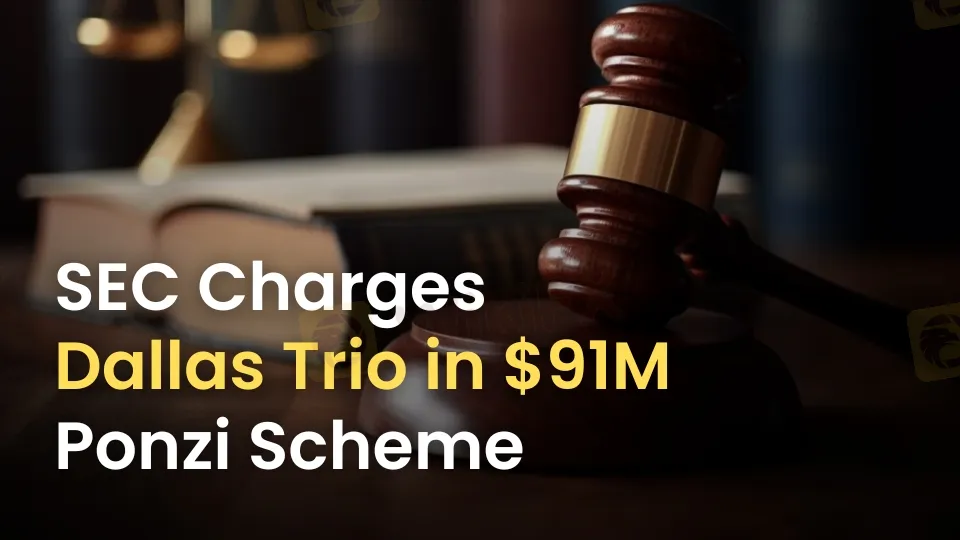SEC Charges Dallas Trio in $91M Ponzi Scheme Defrauding Investors
Abstract:The SEC charges Kenneth W. Alexander, Robert D. Welsh, and Caedrynn E. Conner for running a $91M Ponzi scheme, promising false returns and misappropriating funds.

The U.S. Securities and Exchange Commission (SEC) has charged three Dallas-Fort Worth residents—Kenneth W. Alexander II, Robert D. Welsh, and Caedrynn E. Conner—with running a massive Ponzi scheme that swindled over 200 investors out of at least $91 million. The fraudulent operation, spanning May 2021 to February 2024, promised lucrative returns but delivered devastating losses.
The SEC alleges that Alexander and Welsh masterminded the scam through the Vanguard Holdings Group Irrevocable Trust (VHG), a supposed powerhouse in international bond trading. They lured investors with “guaranteed monthly returns of between 3% and 6%” and assurances that principal investments would be repaid after 14 months. However, the SEC claims VHG was a sham with no real revenue, propped up by Ponzi-style payments using new investors money.
Caedrynn E. Conner played a key role by funneling over $46 million into VHG through his own entity, the Benchmark Capital Holdings Irrevocable Trust. Together, the trio peddled a fake financial product called a “pay order,” marketed as a safeguard against losses, but the SEC says it was worthless. Instead of generating profits, Alexander and Conner allegedly siphoned off millions for personal gain, including Conners lavish $5 million home purchase.
Sam Waldon, Acting Director of the SEC‘s Division of Enforcement, condemned the scheme: “As we allege, the defendants conducted a large-scale Ponzi scheme that caused devastating losses to investor victims, while Alexander and Conner misappropriated millions of dollars of investor funds.” He reaffirmed the SEC’s resolve to pursue justice for defrauded investors.
Filed in the U.S. District Court for the Eastern District of Texas, the SEC‘s complaint accuses the trio of violating federal securities laws’ antifraud and registration rules. The agency is pushing for permanent injunctions, repayment of illicit profits with interest, and hefty civil penalties to hold them accountable.
This case underscores the dangers of Ponzi schemes masquerading as legitimate investments. Investors were drawn in by bold promises of steady returns and security, only to see their savings vanish. The SECs action serves as a stark reminder to scrutinize too-good-to-be-true opportunities in the financial world.

Read more

How Regulated Brokers' High-Tech Platforms Boost Profits
Discover why regulated brokers’ high-tech platforms boost profits with trust, cutting-edge tools, and risk management. Maximize returns in 2025’s dynamic markets!

MoonPay Opens U.S. Headquarters in NYC Amid Crypto Growth
MoonPay expands its U.S. operations with a new NYC headquarters, driving innovation in crypto payments while navigating evolving regulatory landscapes.

Morgan Stanley Plans Crypto Trading on E*Trade by 2026
Morgan Stanley plans to bring cryptocurrency trading to E*Trade by 2026, expanding its crypto offerings with new partnerships and a focus on investor demand.

How Two Simple Messages Led to a Million-Ringgit Disaster
In Penang, a 70-year-old account manager from a private company lost RM1.36 million after falling for a scam advertised through WhatsApp that promoted a stock trading app called ‘BIONM’. The app claimed it could give returns of 8% to 15% within just two months.
WikiFX Broker
Latest News
OANDA Expands ETF Offerings in EU for Portfolio Diversification
FCA Introduces PASS and AI Testing to Support Financial Innovation
FCA Warns Public About 7 Unauthorised Financial Firms
Webull Canada Launches Options Trading and Advanced Tools
FTX Launches Legal Action to Reclaim Tokens from NFT Star and Delysium
Forex Traders Shift Focus: Risk Management Over High Leverage in 2025
Yen's Dramatic Rebound: What Should Investors Do Now?
SEC Charges Dallas Trio in $91M Ponzi Scheme Defrauding Investors
Why High Leverage Causes Massive Losses in Forex Trading
Retiree Loses RM100,000 in Fake Investment Scheme that Promised 18% Return
Rate Calc
